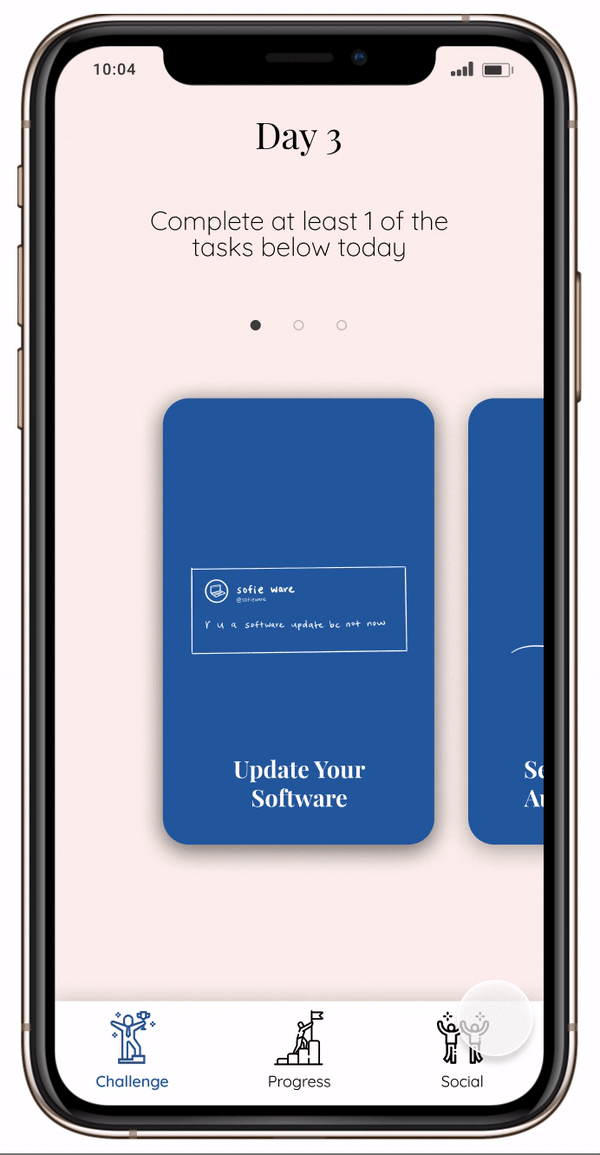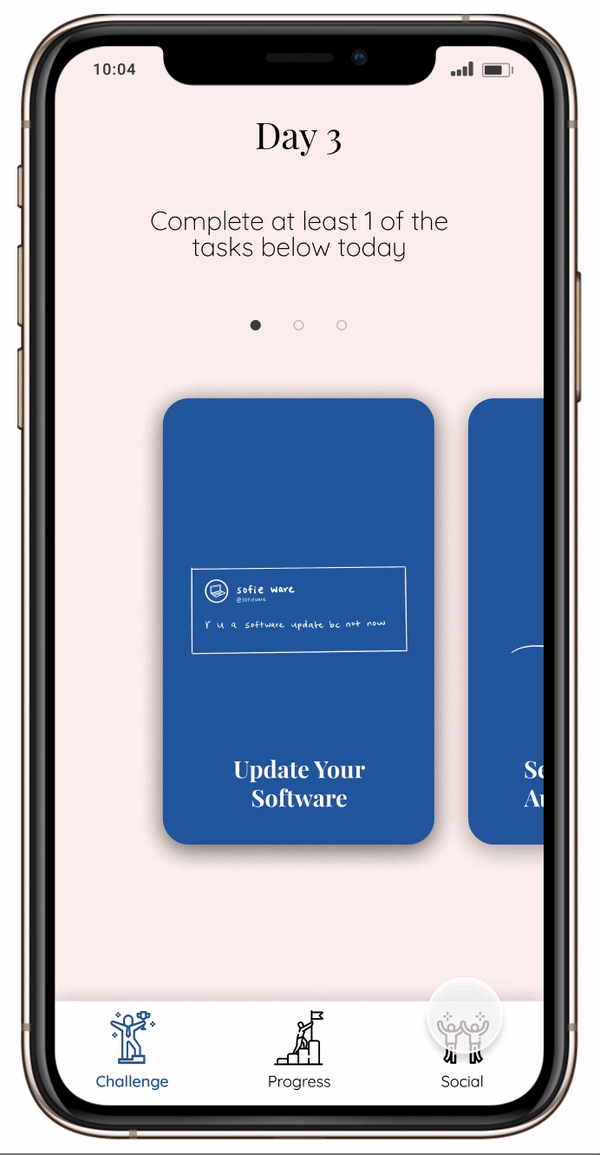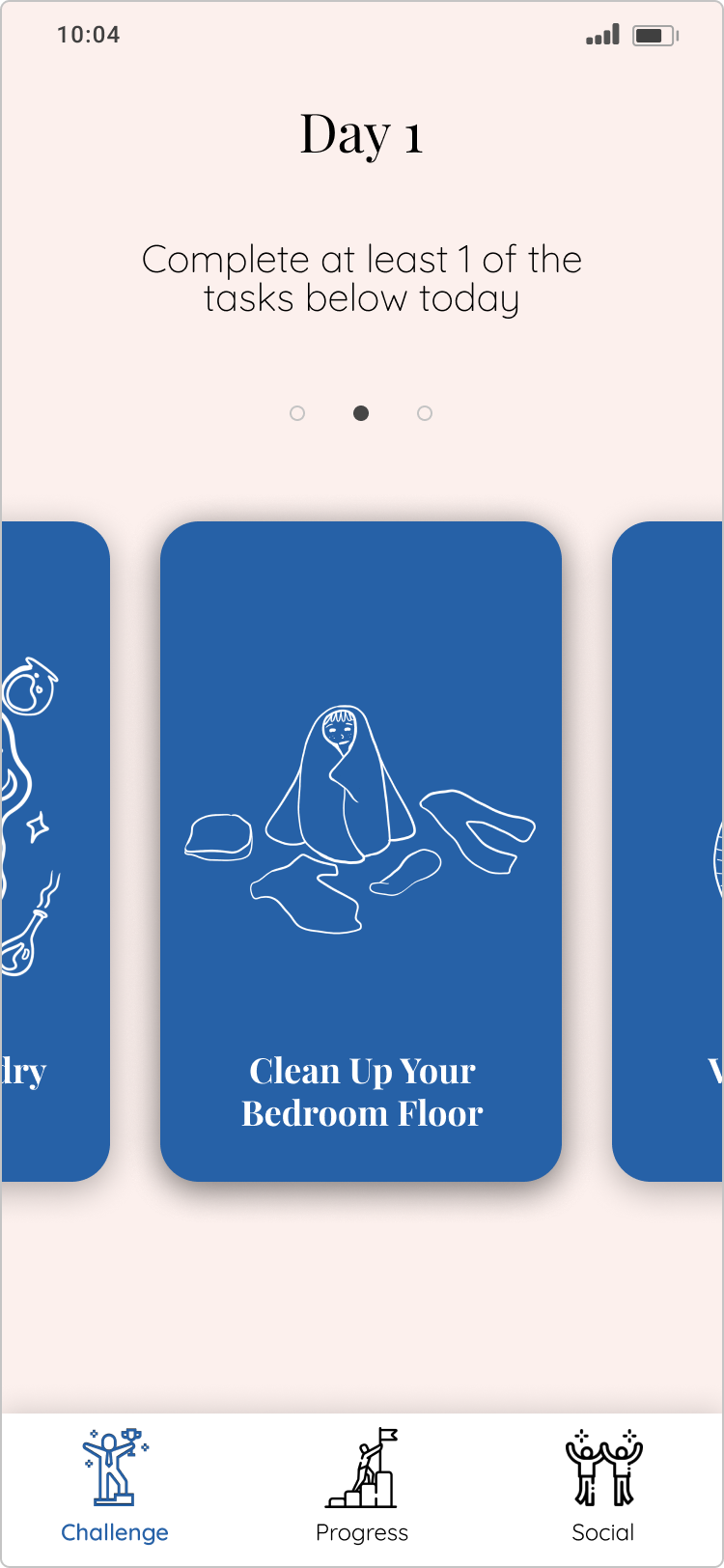30 Day Adulting Challenge
My Role
UX Research (Co-Lead)
UX/UI Designer
Team
Eunice Choe, Ari Daly, Irene Lin, Megan Parisi, Gautham Sajith
Client/Context
Social Cybersecurity Lab
Persuasive Design Course (Final Project)
Timeline
10 weeks
Oct - Dec 2019
Overview
The Challenge
The Carnegie Mellon University Social Cybersecurity lab reached out to our team to create an intervention that would encourage people to adopt cybersecurity behaviors.
In recent years, data breaches and phishing scams have reached an all time high, and although information on such events have been widely discussed in the media, encouraging people to adopt cybersecurity measures is still extremely difficult.
Our group stepped up to the task to come up with a novel approach to tackling this issue. Ultimately, we created the 30 Day Adulting Challenge — a mobile app for those seeking to improve their “adulting” habits (including cybersecurity).
The Problem
How might we get people to adopt better cybersecurity habits? How might we attempt this in a novel and engaging way?
The Solution
The 30 Day Adulting Challenge mobile app: a self-help app that intermixes cybersecurity with other tasks that are considered good “adulting” practices.
persuasive Design
Psychological techniques Incorporated Into Design
Intermixing
An embedded design strategy in which the intended content of a design is mixed with “off-topic” content to make the true persuasive intentions of the design less obvious (and thus more effective).
Each day focuses on one “adulting” topic.
While some days may focus on cybersecurity, we intermix in other topics such as cleaning, style, nutrition, finance, and more. By intermixing cybersecurity topics with other “adulting” topics, we hope individuals would incorporate cybersecurity into their schema for adulting.
Theory of Planned Behavior
The idea that one’s intentions toward a behavior, subjective norms, and perceived behavioral control are predictors of behavioral intention.
Changing Societal Norms to Change Behavior
By including cybersecurity topics in this challenge, we hope to make it a society norm to consider cybersecurity a part of adulting (which the Theory of Planned Behavior suggests in turn would change cybersecurity behavior).
Social Proof
The phenomenon wherein people often copy the actions of others (especially when unsure of how to behave themselves).
Motivation With Social Proof
Friends can be linked on the app. When they complete a task, it’ll show up on the Social feed. This can help motivate users to continue, as well as spread word of the challenge.
The Final Prototype
The 30-day Adulting Challenge App
Designed for those who seek to improve their life skills, and become better “adults,” the 30-day Adulting Challenge provides guidance and suggestions for beginning to develop healthier habits.
Every day, users complete at least 1 of 3 tasks. The task card can be expanded to view additional details about the task and to mark the task as complete. Once at least 1 of the daily tasks is completed, the user can progress to the next day.
Some people may already have a habit of doing the tasks presented in the daily challenge, so they are able to indicate that they already do the task and in return receive a new, more challenging task.


Client Feedback
“No one else has come up with such a novel concept for behavior change with cybersecurity.”
- Cori Faklaris, Co-PI for the CMU Social Cybersecurity Lab
“Longer term, there might be a compelling business opportunity.
I could imagine an entire set of 30-day challenges.”
- Jason Hong, CHIMPS, CyLab, Co-PI for the CMU Social Cybersecurity Lab
We have shared our prototype with the Social Cybersecurity team and they are interested in adopting this project and conducting a full experiment with our concept. We will be meeting mid-May to discuss our next steps…
The Process
User Interviews
We conducted a handful of initial user interviews to better understand young adult’s knowledge of cybersecurity risks and the measures they currently take (or rather, don’t take) to keep themselves secure
These interviews revealed that young adults don’t think of safe cybersecurity practices as a part of adult life
Literature Review/Competitive Analysis
Paper Prototyping
Each member of our team created a paper prototype of how we initially envisioned the app to look like and what features we expected it to have
We voted on features and themes that we liked, and mixed and matched the ideas together for the next round of prototyping
Mid-Fi Prototyping
After an initial round of digital wire-framing and creating mid-fi prototypes, we iterated on our designs and chose three distinct prototypes to user test
User Testing and Prototyping
Our team conducted think-alouds with 5 participants with the 3 mid-fi prototypes
The user interviews helped us in identifying the strengths and weaknesses of each prototype and guided our direction for the next round of prototyping
User Testing Content
We conducted a diary study with 8 participants to test the content of the 30-day Adulting Challenge over the course of 5 days
We were specifically testing whether users a) would actually choose and complete a task each day for several consecutive days, and b) enjoyed the content and copy of the 30-day Adulting Challenge which was written with a specific whimsical and self-deprecating humor
The feedback received through the diary study directly influenced the content in the final version of our design
Hi-Fi Prototyping
Our team polished our design and completed the content and copy of the 30-day Adulting Challenge
We finalized the app’s motion and interaction features
My Role
My most notable contributions:
Ideating product features based on research
Generating paper prototypes to envisage different page layouts and interactions
Constructing user testing guides and running user testing sessions (design testing and diary studies)
Reporting testing results back to the team to inform design iterations based on user feedback
Collaboratively creating the mid- and hi-fidelity prototypes for our app







